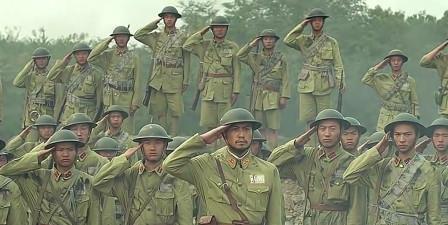What is history: it is the echo of the past to the future, the reflection of the future on the past. - Hugo
After the outbreak of the War of Resistance Against Japan, in addition to the nationalist army led by Chiang Kai-shek, there were also many local miscellaneous armies, such as Yan Xishan's Jin Sui Army, as well as Li Zongren's Gui Army, Feng Yuxiang's Northwest Army, Zhang Xueliang's Northeast Army, Liu Xiang's Sichuan Army, and Long Yun's Dian Army. The combat effectiveness of the miscellaneous army is naturally inferior to that of Chiang Kai-shek's nationalist army, but there is a miscellaneous army with strong combat effectiveness, and it is the Gui army led by Li Zongren and Bai Chongxi.
The Gui Army refers to the soldiers formed by the people of present-day Guangxi, known as the Gui Army. Guangxi has been a fierce folk custom since ancient times, and the people there advocate force, and during the Ming Dynasty, they were known as wolf soldiers and were very good at war. Therefore, in the Republic of China period, when the warlords throughout the country were divided, the Guangxi warlord Lu Rongting also became one of the most powerful local warlord representatives in the south, and Zhang Zuolin in the north was on a par with Zhang Zuolin. However, it was later replaced by Li Zongren and Bai Chongxi, who were historically referred to as the new Gui warlords. Under the leadership of Li and Bai, the Gui army went strong and prosperous, and during the Northern Expedition, it won the name of the steel army, including, later, the scuffle between warlords in various places, the Gui army bravely crowned the southwest, and successively defeated the Xiang Army, the Guangdong Army, the Dian Army and other local forces, becoming the strongest local army in the south.

Gui Jun
In the course of the subsequent battles with the Red Army, there were also successive victories, so Mr. Peng commented on the Gui Army; fierce as a tiger, evil as a wolf. Including in the later period of the War of Resistance Against Japanese Aggression, the performance of the Gui Army was recognized by the people of the whole country, who fought bravely on the battlefield to kill the enemy and also made certain contributions to the victory of the War of Resistance. At the same time, the Gui Army also emerged a large number of generals who could recruit good warriors, Bai Chongxi, who was known as the God of War, Li Pinxian, who was powerless to defeat the Japanese army, Liao Lei, two tough generals, as well as Xia Wei, Li Benyi and others who could recruit good warriors in the Gui Army.
The gui army's combat effectiveness is well known to the world, so during the Liberation War, the Second Field Army (Central Plains Field Army) and the Third Field Army (East China Field Army) have been avoiding fighting with the Gui Army. More importantly, during the Liberation War, both field armies had suffered losses from the Gui Army.
Bai Chongxi
When the Central Plains Field Army advanced into the Dabie Mountains, it was once besieged by the Gui Army, which caused Heavy Losses to Liu Shuai, who had always been good at fighting wonderful battles, reduced his combat effectiveness by more than half, and almost destroyed the entire army. After the war, Liu Shuai issued such a speech; in the future, "first fight the weakest security team, then fight the stronger national army, and finally fight the strongest Gui army." This is why the Second Field Army has always avoided fighting the Gui Army during the Liberation War.
However, as a period of the Liberation War, the East China Field Army, which was brave and good at war, also suffered losses from the Gui Army. During the operation in the central Soviet Union, the East China Field Army mobilized 19 regiments and attacked 2 regiments of the Gui Army in Sixian County, and the result was a disastrous defeat. In 1947, after annihilating the entire 74th Division, Huaye divided his troops and besieged the Seventh Army of the Gui Army and reorganized the Forty-eighth Division, resulting in huaye's first column and the fourth column losing more than 20,000 people. You know, these two columns were HuaYe's ace columns, and the results were fiasco. If it was an ordinary column, it might be completely destroyed.
Therefore, Su Yu commented on the Nationalist army: "To distinguish which are elite troops, first, we must look at the equipment, and the American equipment must definitely be elite troops; second, we must look at the accent, and the troops with the Guangxi accent must also be elite troops." If it is both American equipment and Guangxi accent, it is definitely the most elite in the national army.
Because, in the Liberation War, the two major field armies of Erye and Sanye have always avoided fighting with the Gui Army, as a result, the core combat effectiveness of the Bai Chongxi Group has been basically well preserved. In the end, Bai Chongxi's Gui army was destroyed, and it was only when the Fourth Field Army went south that the Gui army began to decline after annihilating its main force in the Battle of Hengbao. According to statistics, the Fourth Field Army also paid a lot of casualties until the end of the battle with the Gui Army, and only then did it achieve victory.